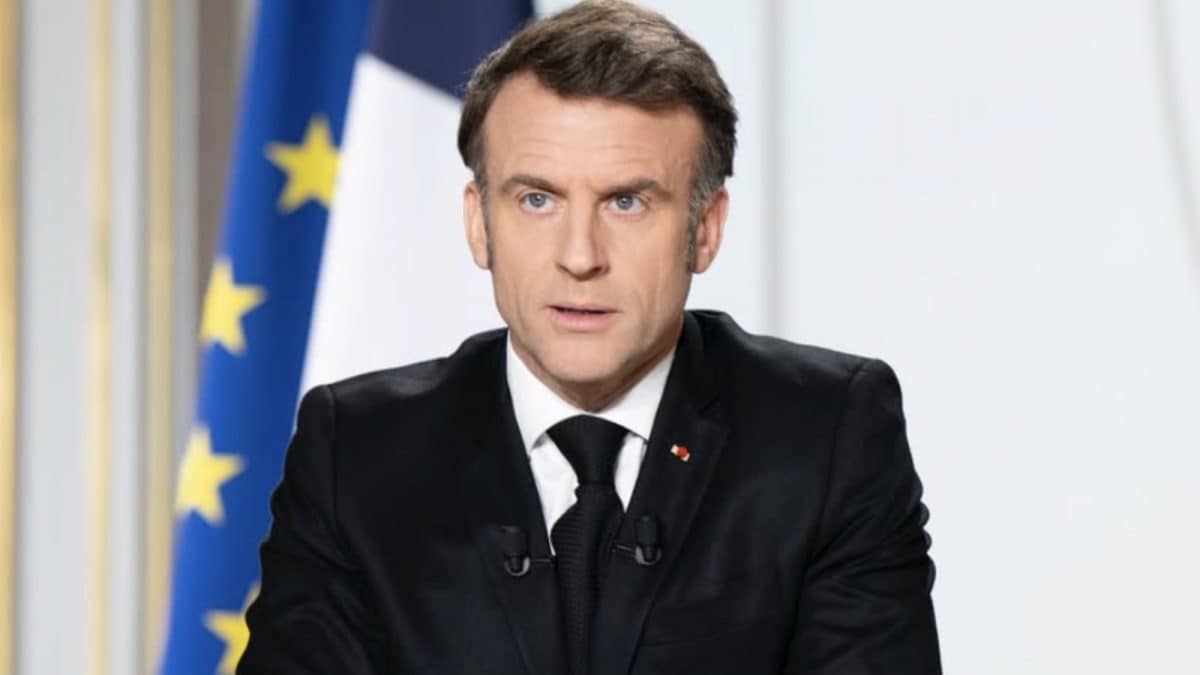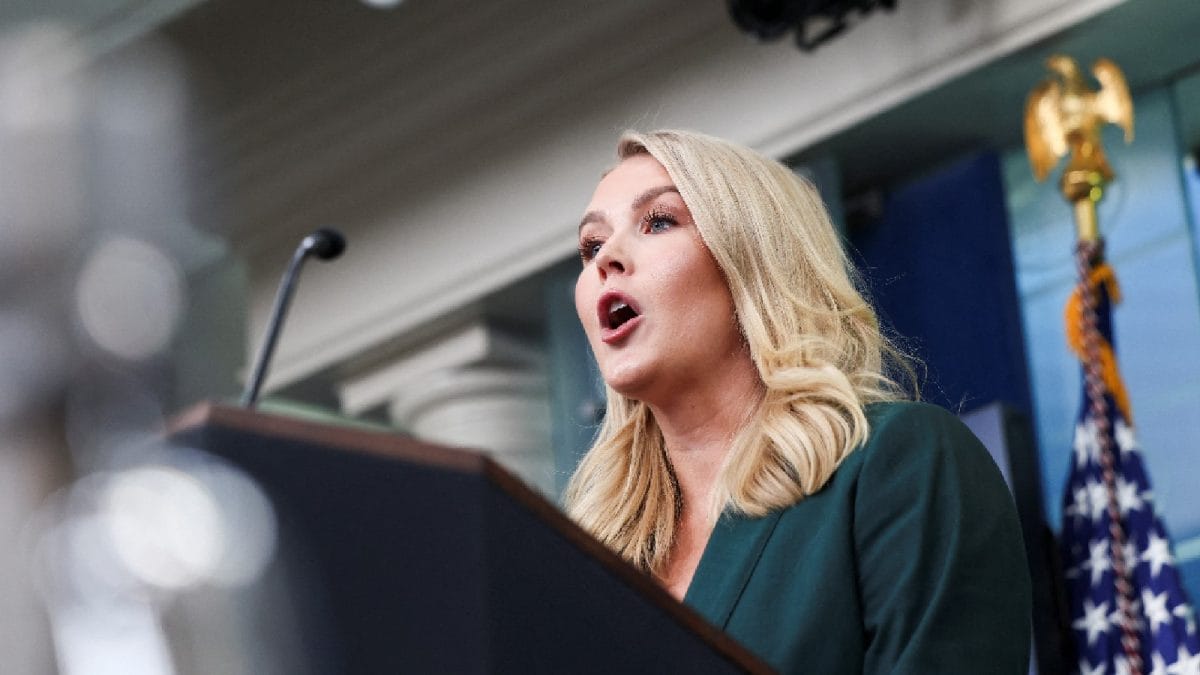'The time for peace has come': Macron announces France's recognition of Palestine
Emmanuel Macron announces that France has formally recognized the Palestinian state.
“We must do everything within our power to preserve the very possibility of a two-state solution, Israel and Palestine living side by side in peace and security,” he says.
The time has come.
This is why, true to the historic commitment of my country to the Middle East, to peace between the Israelis and the Palestinians.
This is why I declare that today, France recognises the state of Palestine.
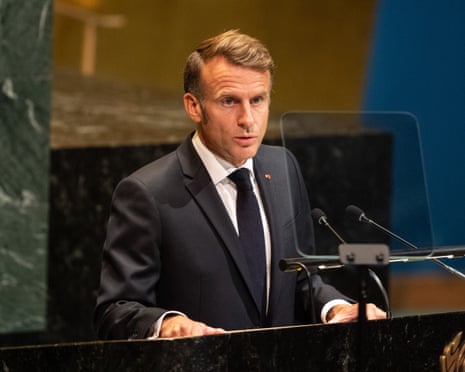
Key events 29s ago Belgium recognises state of Palestine 8m ago Israel 'working to prevent a Palestinian state from ever being established', says Carney 41m ago Monaco recognises state of Palestine 1h ago Analysis: Allies’ recognition of Palestine angers Netanyahu but his options for response are limited 2h ago Palestinian president calls on Hamas to 'surrender their weapons' 2h ago 'Statehood for Palestinians is a right, not a reward,' says UN chief 2h ago 'Morally, legally and politically intolerable': Guterres calls on Israel to end 'creeping threat of annexation' 2h ago Macron reframes Palestinian recognition as 'a defeat for Hamas' 2h ago 'The time for peace has come': Macron announces France's recognition of Palestine 2h ago 'Nothing justifies the ongoing war in Gaza,' says Macron 3h ago 'We can no longer wait' to recognise Palestine, says Macron 3h ago France poised to recognise Palestine as key UN summit begins 3h ago Israeli UN ambassador refuses to rule out West Bank annexation 3h ago Arab and Muslim leaders to meet Trump to discuss peace plan for Gaza 3h ago US and Israel 'will not take part in this charade', Israel's UN ambassador says ahead of summit 3h ago Trump believes Palestinian recognition rewards Hamas, says White House 4h ago Donald Trump to address UN general assembly on Tuesday 5h ago World leaders gather in New York for UN summit on two-state solution as France prepares to recognize Palestine 8h ago Death toll from Israeli attacks on Gaza reaches 65,344 says health ministry 9h ago Two hospitals in Gaza City shut down after intense Israeli bombardment 11h ago What do opponents of recognising Palestinian statehood say? 11h ago Israel reopens key border crossing with Jordan 11h ago Italian cities see protests, strikes and blockades against Israel's 'genocide' in Gaza 12h ago Malta to announce formal recognition of Palestinian state later today 13h ago What does recognition of Palestinian statehood entail practically? 14h ago Why is the UK recognising Palestinian statehood now? 14h ago Qatar welcomes recognition of Palestinian state by some western countries 14h ago European officials warn Israel over West Bank annexation plans following moves towards recognition Show key events only Please turn on JavaScript to use this feature
Belgium recognises state of Palestine
Belgium’s prime minister Bart De Wever announces that his country is joining other nations in recognising a Palestinian state to give a “strong political and diplomatic signal to the world”.
He adds that the legal recognition of a Palestinian state can only proceed “once all hostages have been released and all terrorist organisations such as Hamas have been removed from the governance of Palestine”.
The effective conduct of diplomatic relations with the new state of Palestine, including the opening of Belgian embassy and the conclusion of international agreements, will be carried out once the objectives of the New York Declaration have been achieved.
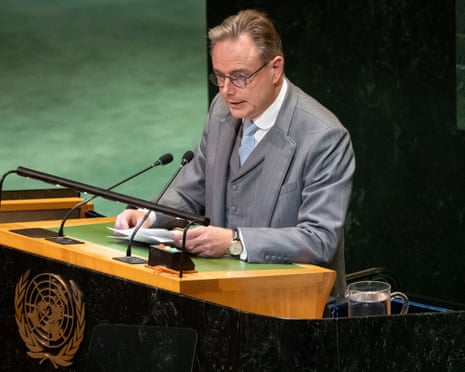
Carney says recognising Palestine “empowers those who seek peaceful coexistence and the end of Hamas”.
“It doesn’t legitimise terrorism,” he says, echoing other leaders in a rebuke to Israeli and American accusations.
Israel 'working to prevent a Palestinian state from ever being established', says Carney
Canada’s prime minister Mark Carney says “the current Israeli government is working methodically to prevent the prospect of a Palestinian state from ever being established”.
He speaks of illegal settlement expansion in the West Bank, and the aggression in Gaza, which has claimed the lives of tens of thousands of civilians, the displacement of millions and the devastating famine.
Sanchez calls this conference a “monumental step forward” but adds that it only marks the beginning of the road.
He calls for the state of Palestine to be admitted as a fully fledged member of the UN.
He also calls for an immediate peace and end to the genocide in Gaza.
In brief, strongly worded remarks, the prime minister of Spain, Pedro Sanchez, notes that while recognising Palestine is urgent, “it is all the more urgent that there exists a Palestinian people in the state that we are claiming to recognise”.
“But regrettably,” he goes on, “the Palestinian people are being annihilated.”
He supports a two-state solution, “but let us be lucidly clear, there is no solution possible when the population of one of those two states is the victim of a genocide”.
Spain recognised Palestine back in May 2024, along with Norway and Ireland.
Monaco recognises state of Palestine
Monaco has become the latest country to recognize a Palestinian state, with Prince Albert II making the announcement at the UN general assembly summit earlier.
He said that since the beginning, his country has defended Israel’s right “to live within safe and recognised borders and to enjoy security therein”, as well as “the right of the Palestinian people to have a sovereign, viable and democratic state”.
“Today, we wish to reaffirm our unwavering support to Israel’s existence, and we also wish to recognize Palestine as a state under international law,” he said to applause.
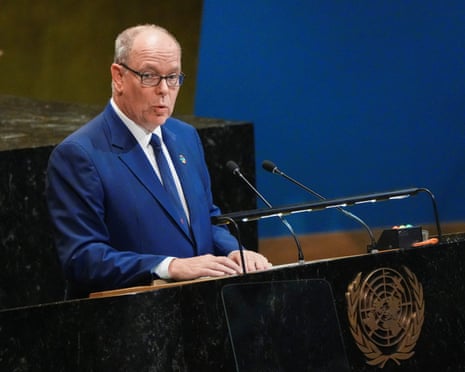
Ramaphosa calls firstly for global recognition of Palestine and its sovereignty and territorial integrity.
Secondly, for an immediate ceasefire and an end to the genocide, and the release of hostages by Hamas and prisoners by Israel.
Thirdly, full respect for international law, including for UN resolutions and opinions, and the decisions of the international court of justice.
Fourthly, the removal of obstacles to the two-state solution, including a halt to illegal settlements and a removal of the separation wall.
Lastly, the restoration of humanitarian aid and the reconstruction of Gaza.
Ramaphosa condemns the October 7, 2023 Hamas attacks and says Israel “has unleashed disproportionate punishment against the people of Palestine”.
The only solution is a two-state solution, he says.
Its viability depends on “full and universal respect for international law”, he says.
He speaks of how only Israel was created in 1947, “casting and ushering the Palestinians into a decades-long wilderness of statelessness, characterised by decades of occupation and now genocide”.
He congratulates Macron and others for their “bold” and “long overdue” decision to recognise the sovereign state of Palestine.
(South Africa recognised Palestine in 1995, after its first post-apartheid democratic elections).
South African president Cyril Ramaphosa calls this “crucial” conference one of great significance, “not only for the people of Palestine, not only for the people of Israel, but for all people who cherish the ideals of freedom and self-determination”.
Analysis: Allies’ recognition of Palestine angers Netanyahu but his options for response are limited

Emma Graham-Harrison
Benjamin Netanyahu was quick to denounce the recognition of a Palestinian state by many of Israel’s historic allies, but the prime minister may be struggling to decide how to turn rhetoric into a concrete response.
His options are perhaps more constrained than he would have his supporters believe. He has variously threatened annexation of occupied Palestinian land and bilateral action against countries that joined the tide of recognition.
But laying formal claim to part or all of the West Bank would jeopardise the Abraham accords, the historic agreement that normalised ties with regional powers including the United Arab Emirates.
That deal was perhaps the most high-profile foreign policy achievement of Donald Trump’s first presidency, cited in nominations for the Nobel peace prize he openly covets, and one of Netanyahu’s own landmark achievements.
The UAE, one of its most important partners, has already said annexation is a “red line”, and the deal’s collapse would carry a high risk of alienating Netanyahu’s single most important supporter.
Israel chose a bilateral response to Ireland, Norway and Spain when they recognised a Palestinian state last year, including withdrawing ambassadors.
Doing the same thing now, when so many key allies have followed suit, would be far more complicated – and could harm Israel far more than its targets, former Israeli diplomats said.
It would accelerate Israel’s trajectory towards the isolated “super-Sparta” status that Netanyahu celebrated last week and then backed away from after public outrage and economic warnings.
Alon Liel, a former diplomat who served as Israel’s consul general to South Africa, said:
I think its such a difficult dilemma that Netanyahu decided to postpone. There is no way Israel will not respond, and there is no way Israel will respond in a clever way. The cabinet is on the point of discussing which mistakes to make.
Read the rest of Emma’s analysis here:
Abbas also expresses readiness to work with US president Donald Trump, Saudi Arabia, and other partners to implement any peace plan adopted during the UN conference.
Abbas also commends the 149 nations which have already recognised a Palestinian state, and calls on those which have not done so to follow suit.
We commend the positions of those countries that recognised the state of Palestine, we call on those who have not yet done so to follow suit. We call for your support so that Palestine becomes a fully-fledged member of the United Nations.
Within three months of the end of the war, Abbas says, an interim constitution will be drafted to ensure the correct transfer of power from the authority to the state takes place.
Elections will then be held under international observance, he adds, describing his aspirations for a state governed by the rule of law.
Abbas also called for a permanent ceasefire and ensuring access to humanitarian aid through the UN and Unrwa.
He also calls for the start “without delay” of the reconstruction of Gaza and the occupied West Bank.
Palestinian president calls on Hamas to 'surrender their weapons'
Speaking via video link, Palestinian president Mahmoud Abbas says Hamas must have “no role” in governing Gaza in the future and calls on Hamas to hand over its weapons.
Hamas and other factions must surrender their weapons to the Palestinian Authority.
What we want is one unified state without weapons, a state with one law and one legitimate security forces.
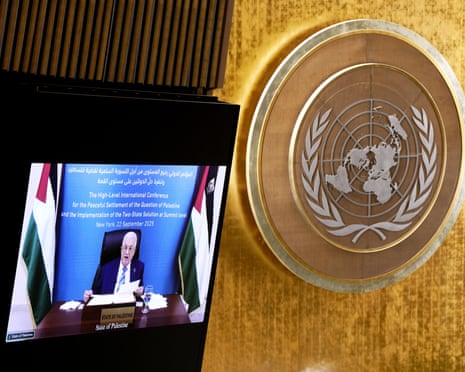
“The horrors of Gaza make equally clear that we cannot allow such devastation to happen again,” Baerbock says.
She says she has spoken with both Palestinian people, whose family members are “buried in the ruins of Gaza,” and families of the hostages.
“As one Israeli mother told me, it does not bring my child back if a Palestinian mother loses her child in Gaza,” she recalls.
UN general assembly president Annalena Baerbock condemns Israeli settlement expansions and demolitions in the occupied West Bank, actions which are “eroding any prospects for a political solution”.

 2 hours ago
2 hours ago













